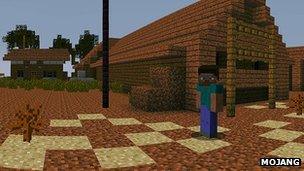Minecraft to aid UN regeneration projects
- Published

Residents will be able to take a virtual stroll around the Minecraft models
Development plans for 300 places around the world are being modelled in Minecraft so residents can help decide how the locations will change.
Called Block by Block, the programme is part of a collaboration between Minecraft-maker Mojang and UN Habitat.
Urban locations will be recreated on computer using Minecraft allowing residents to take a virtual tour.
They will also be able to change the model and help decide how regeneration cash should be spent.
One of the first places modelled in Minecraft as part of a pilot for Block by Block is the Undugu playground - part of the Kibera slum region on the outskirts of Nairobi.
"We'll be putting it into the game so people can walk around and feel like it's as real life as possible," Lydia Winters, community liaison manager at Mojang told the BBC.
Undugu has been recreated on computer by Minecraft modelling firm Fyre UK. Soon those who live around the playground will be able visit it to see the UN's plans to regenerate it.
Virtual visits
Minecraft is set in a world built of cubes, each one of which is made of a different virtual material - dirt, stone, iron ore, diamond and so on. Playing the game involves stacking the cubes to build structures or breaking them down into their raw materials to create objects and artefacts.
The ease with which the real world can be modelled in Minecraft led UN Habitat to approach Mojang to help with its urban regeneration plans, said Ms Winters.
By 2016, 300 of the areas UN Habitat plans to remodel will be recreated in Minecraft allowing the people who live in those places to be involved in how their locale will change.
"It's bringing decision makers together with the youth to all decide on this common ground for public spaces around the world," said Ms Winters.
Details about the project were revealed at the Minecon conference held in Paris from 24-25 November,
- Published26 November 2012
- Published26 October 2012
- Published10 July 2012